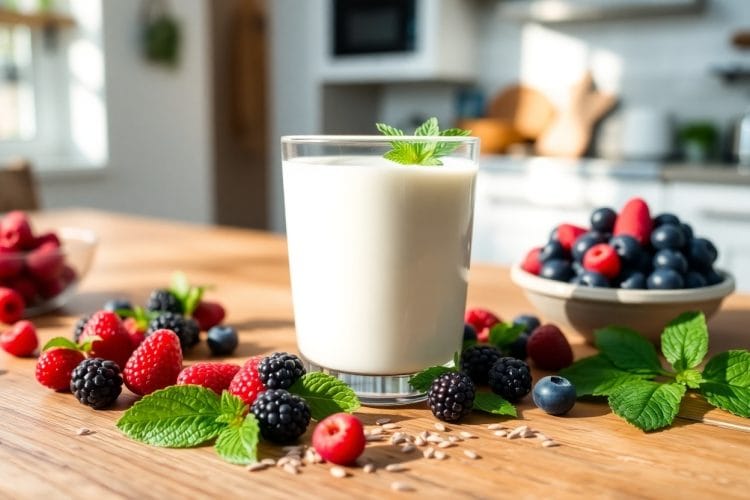
Kefir is one of the oldest and most popular fermented dairy drinks in the world. It’s appreciated for its refreshing taste, gut-friendly bacteria, and broad health benefits. However, like any product, kefir can either help or harm your body—depending on how and how much you consume.
✅ What Makes Kefir So Healthy?
1. Rich in Probiotics (Live Cultures)
Kefir is loaded with live beneficial bacteria and yeast that:
- Help restore a healthy gut microbiome
- Support your digestive health
- Reduce bloating and constipation
- Rebalance gut flora after antibiotic use
If you’re wondering how to improve gut health, kefir is a powerful natural solution.
2. Easier to Digest Than Milk
Thanks to the fermentation process, kefir contains less lactose than milk, making it easier to tolerate—even for people with mild lactose intolerance.
3. Packed with Nutrients
Kefir provides slow-digesting casein protein and essential nutrients like:
- Calcium
- Vitamins B2, B12
- Magnesium, phosphorus
- In some cases, vitamin K2 (especially in homemade kefir)
These nutrients support not only your bones but also your skin, immunity, and energy levels.
So, if you’re looking for how to improve skin health or maintain glowing skin from within, including probiotic-rich foods like kefir in your diet can make a difference.
4. Supports Mental and General Health
Some of the probiotics in kefir have been linked to the gut-brain axis, helping to:
- Boost mood
- Reduce anxiety
- Improve sleep
This makes kefir an excellent option when you’re focused on how to improve overall health and mental well-being.
⚠️ When Kefir Might Not Be Right for You
Despite its benefits, kefir isn’t for everyone. You may need to limit or avoid it if you have:
- Acid reflux, ulcers, or gastritis — its natural acidity may irritate your stomach lining
- Severe lactose intolerance — especially with fresh kefir
- Yeast overgrowth (Candida) — fermented products might worsen symptoms
- Irritable bowel syndrome (IBS) or SIBO — kefir could cause bloating or discomfort
- Kidney issues — due to its protein and mineral content
Also, beware of store-bought kefir with added sugars, flavors, or pasteurization after fermentation, which can kill beneficial bacteria.
🧠 How to Drink Kefir Safely and Effectively
1. Choose Plain, Natural Kefir
Go for options with no added sugar or flavorings. Look for “live active cultures” on the label.
2. Stick to 300–500 ml per day
Drinking 1 liter daily is too much for most people and can overload you with saturated fat and protein. A moderate amount is ideal.
3. Pick the Right Fat Content
- 1% — great for quick and safe weight loss
- 2.5% — good balance for most adults
- 3.2% or more — richer, but not ideal for daily use if you’re watching calories or cholesterol
If you’re aiming to lose weight quickly and safely, kefir can be a satisfying snack or dinner replacement when combined with fiber or protein-rich foods.
4. Combine With Healthier Additions
Add flax seeds, berries, cinnamon, or oat bran to boost fiber and digestion.
5. Best time to drink? Evening.
It helps relax your body, aid digestion, and even promote better sleep.
💡 Tips for Maximum Health Benefits
- Want even more probiotics? Make homemade kefir using live cultures—it’s far richer in beneficial bacteria.
- Don’t chug it with meals; drink kefir between meals or as a light evening snack.
- Store it properly and avoid expired bottles.
📌 Conclusion
Kefir is a simple, affordable, and highly beneficial drink for anyone aiming to improve gut health, enhance skin quality, lose weight safely, or simply boost overall well-being. The key is moderation, quality, and listening to your body’s response. When consumed mindfully, kefir can truly become a daily ally on your health journey.